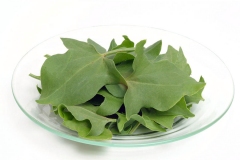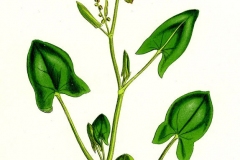This leafy vegetable derived its name from a French name ‘surele’ which also means sour in English. Sorrel is not a major part of the American cooking but it plays a major role in French cuisine; Egyptians, Greek and Romans also use this herb abundantly in their cooking. The French sorrel is an herb cultivated commonly in northern America but failed to gain importance. French sorrel has been a popular culinary herb since 14th century. This herb has been a part of French kitchen since ages and is known to be grown extensively in Europe as well as Asia. As a culinary herb, it is used mainly in salads. The flavor of French sorrel is slightly bitter or tangy, spiced with a hint of lemon; the sharp flavor is due to oxalic acid.
Plant description
French sorrel is a low-growing, creeping perennial herb that grows up to 45 to 60 cm tall and spread up to 60 cm wide. It grows the male and the female parts separately which means it is dioecious in nature. It is hardy in most regions, tolerating frost, full sun and short dry spells. The plant is found as a naturalized garden escape on roadsides, railway banks, old walls, waste ground, lawns, gardens as well as meadows and grassy slopes. It grows best in the profound, rich, damp, but properly drained soil. The stems of French sorrel are prostate or climbing forming dense clusters. In addition, they have a strong and branched rootstock. French sorrel taste a little less acidic when compared to the other sorrels that are cultivated such as garden sorrel, rumex scorrel, spinach dock etc.
Leaves
The leaves of French sorrel are green and appear like a shield. It is lance-shaped, shiny green and can be from 6-12 inches in length. The French sorrel leaves are juicier and sharply acidic compared to those of garden sorrel. French sorrel leaves possess a distinct lemon flavor.
Flower
Flowers of French sorrel too are small, but have a green color, which changes to reddish-brown later. Flowers of French sorrel usually have both sexes. Garden as well as French sorrel flower during the middle of summer.
Indoor Planting
In case you are growing French sorrels indoors, the plants require a minimum of five hours of direct and powerful sunlight every day. In order to accommodate the long roots of French sorrels, grow them in a pot in deep containers of commercial potting soil. Feed the plants with 50 per cent of the potency of liquid fertilizers once in every two weeks. Plants which have established well have the ability to tolerate drought. Sometimes, French sorrel plants are grown for their leaves, which are edible. There are a number of named assortments of the French sorrel which have been chosen for their ornamental worth. The sorrels are an excellent food for caterpillars of several butterfly species.
History of French Sorrel
In the time of Henry VIII, sorrel was held in great repute in England. The introduction of French Sorrel, with its large succulent leaves, replaced its position as a salad and a potherb. John Evelyn thought that Sorrel imparted ‘so grateful a quickness to the salad that it should never be left out.’ He wrote in 1720: …”Together with salt, it gives both the name and the relish to sallets from the sapidity, which renders not plants and herbs only, but men themselves pleasant and agreeable.” Culpepper wrote: ‘Sorrel is prevalent in all hot diseases, to cool any inflammation and heat of blood in agues pestilential or choleric, or sickness or fainting, arising from heat, and to refresh the overspent spirits with the violence of furious or fiery fits of agues: to quench thirst, and procure an appetite in fainting or decaying stomachs: For it resists the putrefaction of the blood, kills worms, and is a cordial to the heart…”
Health Benefits of French Sorrel
Listed below are some of the popular health benefits of French Sorrel
1. Helps in prevention against cancer
The herb has been known to be effective in prevention against cancer. It is known to contain high amounts of anti-oxidants and flavonoids which help in removal of free radicals from the body and at the same time helps in prevention against cell mutation.
2. Improve digestive health
This herb has been found to be effective in treating digestive health and is known to help in the maintenance of gastrointestinal systems. It cures and decreases issues such as diarrhea and constipation to a far greater extent.
3. Improve the levels of eyesight
It is known to contain high amounts of Vitamin A which helps in improving the function of eyesight. It consists of beta carotene a popular anti-oxidant which helps in reducing any oxidative stress on the eye muscles.
4. Reduce blood pressure
This herb has been known to contain significant levels of potassium which acts as a vasodilator and hence has been known to be beneficial in maintaining the levels of fluids in the body.
5. Improve the health of kidney
This herb has been known to contain diuretic properties and thus when the leaves of this herb are dried and consumed they encourage urination which helps in removing any toxins out of the kidney.
6. Improve immunity
This herb has been known to contain high amounts of Vitamin C which when consumed helps in increasing the number of white blood cells in the body and at the same time helps in increasing immunity.
7. Improve condition of skin
This herb has been known to be improving the quality of skin and is known to be utilized for treating issues such as ringworm and dry skin. Topical application of this herb can treat rashes and irritation.
Traditional uses and benefits of French Sorrel
- Leaves are antiscorbutic, astringent, diuretic, laxative and refrigerant.
- They are rarely used as a specifically medicinal plant.
- The herb helps to prevent diarrhea and constipation.
- It also prevents numerous diseases like cancer, diabetes, heart disease and hypertension.
- Raw Sorrel helps to cure hemorrhages, chronic catarrh, gonorrhea, urinary infections and scurvy.
- Dried Sorrel leaves are used for the treatment of seasonal fever, itchy skin, and ringworm.
- Consume regularly to get rid of jaundice and kidney stones.
- Extracted juice can be applied to boils, malignant tumors, and indolent ulcers.
- It helps to cure inflammatory and scorbutic diseases.
- French sorrel was used to treat scurvy, encourage urination as well as the circulation of blood.
- Externally, sorrel was used to heal skin complaints as well as to help in having a clear complexion.
Culinary Uses
- Leaves can be consumed raw or cooked.
- They make a delightful addition to the salad bowl and can also be used as a pot-herb.
- This species has less acid leaves and so is often preferred to sorrel (R, acetosa).
- Leaves should be used sparingly due to the oxalic acid content.
- French Sorrels can be eaten raw like spinach or lettuce as a part of salads, can be added in sandwiches, pureed into a thick nutritious soup.
- Sorrels go best with fish and sea food because it balances the taste with its acidity.
- It can be added to quiche or made lasagne layers using sorrel leaves.
- Sauce made for fishes using sorrel leaves is a delicacy enjoyed by many.
- Pesto sauce can also be made using sorrel leaves.
- Sorrel makes an excellent puree, for sauces or soup, and is the main ingredient in the French recipe for soupe aux herbes.
- Complimentary flavors include hard aged cheeses, cream, eggs, fish, caviar, oysters, lentils, potatoes, spinach, onion, shallot, mustard, parsley, tarragon, mint, chervil and nutmeg.
Precautions
- People with a tendency to rheumatism, arthritis, gout, kidney stones or hyper acidity should take especial caution if including this plant in their diet since it can aggravate their condition.
- French sorrels consist of a high amount of oxalic acid which is not recommended for people who are identified with kidney problems as it may deteriorate the existing situation.
- Tea prepared of sorrel leaves leads to gastric disorders.
References:
https://www.itis.gov/servlet/SingleRpt/SingleRpt?search_topic=TSN&search_value=506562#null
https://pfaf.org/user/plant.aspx?LatinName=Rumex+scutatus
https://www.cabi.org/isc/datasheet/116818
https://botanical.com/botanical/mgmh/s/sorfre65.html
https://plants.usda.gov/core/profile?symbol=RUSC8
https://en.wikipedia.org/wiki/Rumex_scutatus
https://www.wikidata.org/wiki/Q1735396
https://grinczech.vurv.cz/gringlobal/taxonomydetail.aspx?id=400321
http://www.theplantlist.org/tpl1.1/record/kew-2424805
https://gd.eppo.int/taxon/RUMSC
Comments
| French Sorrel Quick Facts | |
|---|---|
| Name: | French Sorrel |
| Scientific Name: | Rumex scutatus |
| Origin | Europe and has become widespread in North America and southwest Asia |
| Taste | Slightly bitter or tangy, spiced with a hint of lemon |
| Health benefits | Improve condition of skin, Improve immunity, Improve the health of kidney, Reduce blood pressure, Improve the levels of eyesight, Improve digestive health, Helps in prevention against cancer |
| Name | French Sorrel |
|---|---|
| Scientific Name | Rumex scutatus |
| Native | Europe and has become widespread in North America and southwest Asia |
| Common Names | Buckler’s sorrel, French sorrel, Buckler-leaved sorrel, buckler sorrel, shield-leaf sorrel, Shield dock, Round-leaved Sorrel, Sour Grass |
| Name in Other Languages | Albanian: Lëpjetë Bulgarian: Shtitovidna lapad (щитовиден лапад) Catalan: Badola Croatian: Stitasta kiselica Czech: Šťovík štítnatý Danish: Rundbladet syre Dutch: Spaanse zuring English: Buckler’s sorrel, French sorrel, Buckler-leaved sorrel, buckler sorrel, shield-leaf sorrel, Shield dock, Round-leaved Sorrel, Sour Grass Finnish: Kilpisuolaheinä French: Oseille ronde, , Oseille en écusson, Oseille vraie, Oseille des montagnes, Oseille sauvage comestible, Rumex à écusson, oseille écussonnée German: Schild-Sauerampfer, Französischer Spinat, Römischer Schildampfer, Römischer Spinat, Schild-Ampfer, römischer Ampfer, schildblättriger Ampfer Greek: Lápathon to apidotón (Λάπαθον το απιδωτόν), roúmex aspidotós (ρούμεξ ασπιδωτός) Hungarian: Római sóska, francia lórom Italian: Acetosa romana, Romice scudato, erba pan e vin, Norwegian: Skjoldsyre Polish: Szczaw tarczolistny Portuguese: Azeda romana Russian: Shchavel shchitkovidnyi (Щавел щитковидный) Slovak: Stiavec Slovene: Sčitasta kislica Spanish: Acedera francesa, Acedera redonda, Acedera romana, acedera, vinagrera de pájaro, vinagretas, Swedish: Sköldsyra Turkish: Ekşimen Ukrainian: Shchavelʹ shchytkovyy (ль щитковий) |
| Plant Growth Habit | Low-growing, creeping perennial herb |
| Growing Climates | Found as a naturalized garden escape on roadsides, railway banks, old walls, waste ground, lawns, gardens as well as meadows and grassy slopes |
| Soil | Grow best in the profound, rich, damp, but properly drained soil. |
| Plant Size | Up to 45 to 60 cm tall and spread up to 60cm wide |
| Leaf | Lance-shaped, shiny green and can be from 6-12 inches in length |
| Flowering season | June to July |
| Flower | Flowers are small and green, which turn reddish-brown later |
| Propagation | By seeds or by dividing the adequately grown clumps |
| Taste | Slightly bitter or tangy, spiced with a hint of lemon |
| Plant Parts Used | Leaves |
| Season | July to August |
| Health Benefits |
|








